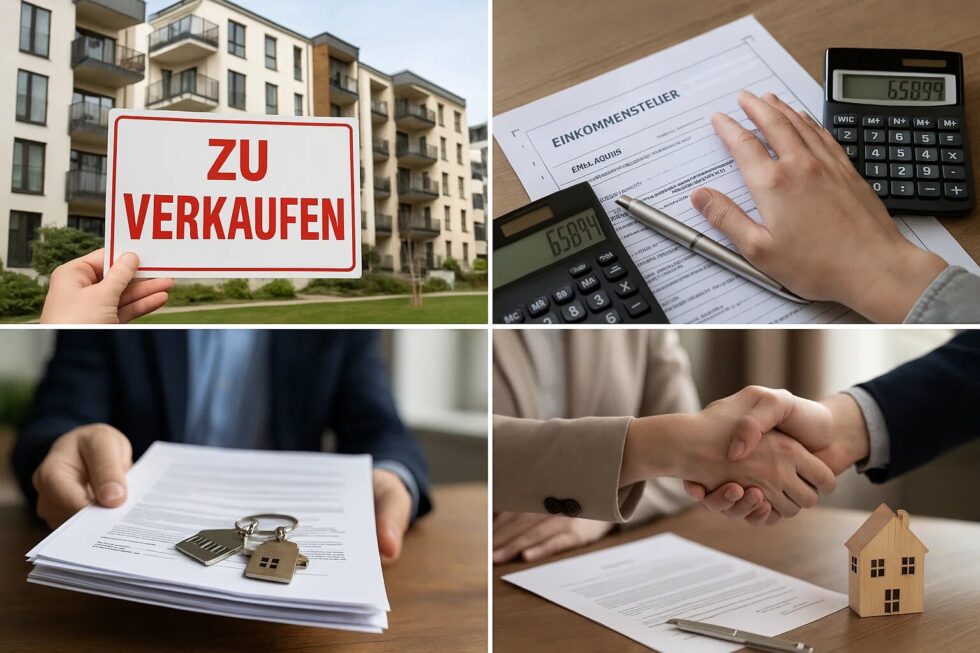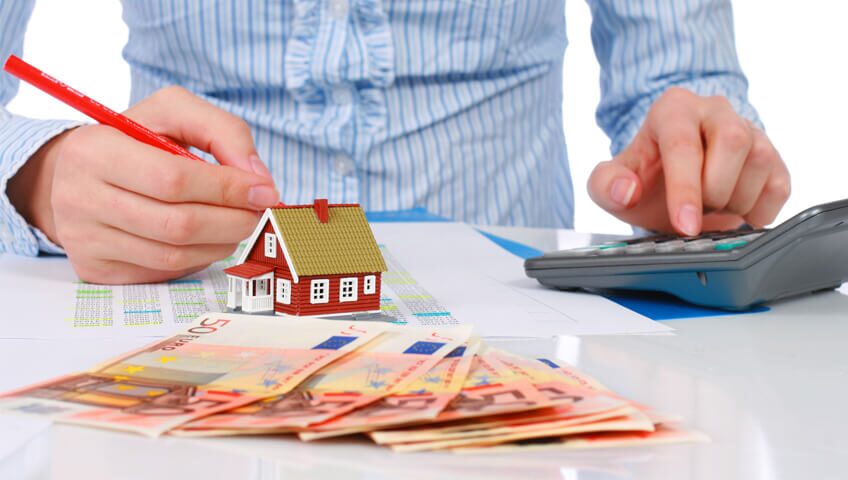How to sell an apartment in Germany: taxes, documents and transaction steps

Selling an apartment in Germany requires not only finding the right buyer but also navigating through a complex framework of taxes, legal documents, and mandatory procedures. Property owners must comply with German civil law, notarization requirements, and fiscal obligations before the transaction can be finalized. Key aspects include the capital gains tax (Spekulationssteuer), the real estate transfer tax (Grunderwerbsteuer), the notarial deed, and the mandatory entry into the land register. Many sellers underestimate the time needed to gather documents such as the energy performance certificate (Energieausweis), the certificate of ownership (Grundbuchauszug), and proof of maintenance funds (Hausgeldabrechnung). Missing paperwork or tax miscalculations can delay or even cancel the transaction. Selling is further influenced by market conditions, regional demand, and mortgage interest rates, making preparation essential. As noted by G.business, understanding each step ensures a smoother sale and avoids costly mistakes.
Understanding property taxes in Germany when selling
Taxes are one of the most critical aspects to consider when selling an apartment in Germany. If the property is sold within ten years of purchase, sellers may face the so-called "Spekulationssteuer," a capital gains tax that can significantly reduce profit. However, if the property was used exclusively for personal living for at least two full calendar years plus the year of sale, this tax is usually not applied. Another aspect involves real estate transfer tax (Grunderwerbsteuer), which is paid by the buyer but indirectly affects negotiations and pricing. Regional differences matter: in Bavaria, the tax rate is 3.5%, while in Berlin and Brandenburg it is 6.5%. In addition, sellers must provide accurate records to the Finanzamt to prevent disputes. It is advisable to consult a tax advisor (Steuerberater) to calculate potential liabilities before listing the property.
Key taxes to consider:
- Capital gains tax (Spekulationssteuer) if selling within 10 years.
- Real estate transfer tax (Grunderwerbsteuer), paid by buyer.
- Possible income tax implications if selling rental property.
- Church tax or solidarity surcharge in some cases.
- Local property tax adjustments (Grundsteuer).
Essential documents required to sell an apartment
The documentation process in Germany is detailed and highly formalized. Sellers must provide a complete ownership certificate (Grundbuchauszug) from the land registry, which proves legal ownership and shows existing encumbrances or mortgages. Another mandatory paper is the energy performance certificate (Energieausweis), which outlines the apartment's energy efficiency and is required by law for all real estate sales. Monthly cost breakdowns such as the utility statement (Betriebskostenabrechnung) and proof of maintenance reserves (Instandhaltungsrücklage) help buyers assess ongoing costs. Building permits, renovation records, and declarations of division (Teilungserklärung) are also often required. Without these documents, the notary cannot complete the transaction. Gathering these papers early prevents delays, especially when dealing with older apartments or buildings under homeowners’ associations (Wohnungseigentümergemeinschaft).
Checklist of mandatory documents:
- Grundbuchauszug (ownership certificate).
- Energieausweis (energy certificate).
- Teilungserklärung (declaration of division).
- Betriebskostenabrechnung (utility statement).
- Instandhaltungsrücklage (maintenance reserve statement).
- Bauunterlagen (construction and renovation records).
- Mietverträge (rental agreements if tenants live in the property).
Step-by-step process of selling an apartment
The German property sale process follows a structured legal procedure. First, the seller lists the property, often through real estate platforms like Immobilienscout24 or via agents (Makler). Once a buyer is found, both parties agree on the price and draft a purchase agreement with the help of a notary (Notar). The notary is mandatory by German law to certify the contract and ensure legality. After the signing, the buyer transfers the funds to a notary-managed escrow account. The next stage involves the land registry updating ownership details, which can take weeks or months depending on the local office. Only after registration and full payment does the property officially change hands. Sellers should also inform their bank if a mortgage exists, as it must be canceled or transferred during the process.
The main stages of the transaction:
- Marketing the property.
- Negotiating with potential buyers.
- Drafting purchase agreement with notary.
- Signing and notarization of the contract.
- Payment via escrow account.
- Updating land registry (Grundbuch).
- Final handover of keys and documentation.
Costs and fees involved in selling
While buyers typically cover most transaction costs, sellers also face certain fees. The notary fee, usually around 1.5–2% of the property value, is generally shared or borne by the buyer, but sellers may pay for additional certifications. Real estate agents charge a commission (Maklercourtage), which can be up to 7.14% including VAT, depending on federal state regulations. Since 2020, buyers and sellers in Germany usually split this commission equally, though exceptions exist. Sellers should also budget for mortgage cancellation fees if a loan is still registered against the property. Administrative fees apply for obtaining official documents, ranging from €10 to €40 per certificate. Preparing an accurate financial overview helps prevent unpleasant surprises.
Typical cost breakdown when selling an apartment:
| Expense type | Who pays | Average percentage/amount |
|---|---|---|
| Notary fees | Buyer (sometimes shared) | 1.5–2% of property price |
| Real estate agent (Makler) | Buyer & Seller split | up to 7.14% incl. VAT |
| Grundbuch (land registry) | Buyer | 0.5% of property price |
| Mortgage cancellation | Seller | €200–€500 approx. |
| Document fees | Seller | €10–€40 per copy |
Practical tips for a successful sale
Maximizing profit and minimizing complications requires careful preparation. Sellers should conduct a professional property valuation to ensure competitive pricing while staying realistic about market trends. Minor renovations or cosmetic improvements, such as painting or upgrading windows, often increase buyer interest and final price. Marketing is crucial: professional photos and clear descriptions on German real estate platforms enhance visibility. Negotiation skills matter, but legal guidance from notaries and lawyers ensures compliance. It is also recommended to prepare a financial plan in advance, particularly if funds are intended for reinvestment or relocation. Timing plays a role too — demand peaks in spring and early autumn, when buyers are most active.
Tips for apartment sellers in Germany:
- Obtain valuation from an expert (Gutachter).
- Prepare energy certificate before listing.
- Declutter and renovate where necessary.
- Use professional real estate photography.
- Compare real estate agent commission rates.
- Plan sale in spring/autumn for higher demand.
- Consult tax advisor for liabilities.
- Keep all documents ready for notary.
Current property prices in Germany’s biggest cities
When selling an apartment, knowing the current market price per square meter helps set realistic expectations. Germany’s real estate market has cooled slightly since 2023 due to rising mortgage interest rates, but urban centers still command strong demand. Berlin remains a hotspot with high competition, while Munich is consistently the most expensive market in the country. Frankfurt, with its financial hub, attracts international buyers, and Hamburg combines port-city charm with rising real estate interest. Sellers should compare average market prices with their property valuation to decide on the best listing strategy.
Average asking prices per square meter (2025):
| City | Average €/m² | Typical 70m² apartment price | Notes |
|---|---|---|---|
| Berlin | €5,400 | ~€378,000 | High demand in Mitte, Prenzlauer Berg |
| Munich | €8,900 | ~€623,000 | Germany’s most expensive market |
| Frankfurt | €6,700 | ~€469,000 | Strong demand near financial district |
| Hamburg | €5,800 | ~€406,000 | Popular in HafenCity and Eimsbüttel |
| Cologne | €4,900 | ~€343,000 | Steady growth in urban districts |
These figures are averages and can vary depending on location, condition, and year of construction. New-build apartments in prime districts can reach over €10,000 per square meter, especially in Munich and Frankfurt. Sellers should follow local property reports or use platforms like Immobilienscout24 to track demand and adjust pricing accordingly.
Common mistakes to avoid when selling an apartment in Germany
Even well-prepared sellers can make errors that cost time and money. The most frequent problems arise from underestimating legal requirements, miscalculating taxes, or neglecting the presentation of the property. Many owners also rely too heavily on their personal valuation without checking market reports, which often leads to unrealistic asking prices. Another critical mistake is failing to secure all necessary documents early, as the notary cannot finalize a sale without them. Delays can frustrate buyers, weaken negotiation power, and lower the final sale price.

5 mistakes sellers should avoid:
- Incorrect tax planning – overlooking capital gains tax or income tax on rental properties.
- Missing documents – not obtaining the Grundbuchauszug or Energieausweis in advance.
- Overpricing – setting unrealistic prices compared to local market averages.
- Weak marketing – poor photos or vague descriptions reduce buyer interest.
- Ignoring professional advice – skipping tax consultants, property appraisers, or legal support.
Selling an apartment in Germany is not only about finding the right buyer but about meeting every legal, fiscal, and procedural requirement. Taxes such as the Spekulationssteuer can heavily impact profits, while missing documents like the Energieausweis can delay or even block a transaction. The involvement of a notary and the entry in the Grundbuch guarantee security but also add time and costs to the process. Market conditions in major cities like Berlin, Munich, and Frankfurt influence both pricing and speed of sale, making professional valuation and strategic timing crucial. With proper preparation — from organizing documents and consulting tax advisors to presenting the property attractively — sellers can achieve a smooth transaction and maximize returns.
Stay connected for news that works — timely, factual, and free from opinion — and insights that matter now: Stock Markets in the US, Europe, and Asia: Where Are the Major Surges Expected
